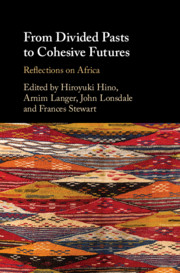Book contents
- From Divided Pasts to Cohesive Futures
- From Divided Pasts to Cohesive Futures
- Copyright page
- Contents
- Figures
- Tables
- Contributors
- Foreword
- Acknowledgments
- Introduction: Understanding Processes of Change in Social Cohesion: Learning from Comparative History
- Part I Social Cohesion in Africa: Case Studies of Past and Present
- 1 Kenya’s Four Ages of Ethnicity
- 2 Better Elections, More Deaths
- 3 Ethnicity, Citizenry, and Nation-Building in Tanzania
- 4 Identity, Inequality, and Social Contestation in the Post-Apartheid South Africa
- 5 Ethnicity, Development, and Social Cohesion in Africa
- Part II Policies and Institutions for Social Cohesion
- Part III Conclusions and Policy Recommendations
- Index
- References
3 - Ethnicity, Citizenry, and Nation-Building in Tanzania
from Part I - Social Cohesion in Africa: Case Studies of Past and Present
Published online by Cambridge University Press: 05 August 2019
- From Divided Pasts to Cohesive Futures
- From Divided Pasts to Cohesive Futures
- Copyright page
- Contents
- Figures
- Tables
- Contributors
- Foreword
- Acknowledgments
- Introduction: Understanding Processes of Change in Social Cohesion: Learning from Comparative History
- Part I Social Cohesion in Africa: Case Studies of Past and Present
- 1 Kenya’s Four Ages of Ethnicity
- 2 Better Elections, More Deaths
- 3 Ethnicity, Citizenry, and Nation-Building in Tanzania
- 4 Identity, Inequality, and Social Contestation in the Post-Apartheid South Africa
- 5 Ethnicity, Development, and Social Cohesion in Africa
- Part II Policies and Institutions for Social Cohesion
- Part III Conclusions and Policy Recommendations
- Index
- References
Summary
Tanzania is commonly cited as “a success story” where a cohesive society has been built in tandem with its nationhood. In this chapter, we offer an account of interplay between ethnicity and social norms in the context of nation building in Tanzania and highlight the historical transformation of localized, ethnic-based mechanisms for self-protection, “trust networks”, to a national framework for trust enhancement and resolution of conflicts at local levels. This, we argue, was the key for acceptance of national identity by Tanzanians for self-protection, and, hence, a transition from divided pasts to cohesive futures. The chapter traces nation building efforts in Tanzania, and explains why Tanzania is an exception to the patterns of violence and instability experienced in Sub-Saharan Africa. It is argued that that, although conflicts are sometime inevitable, cross-cutting identities such as occupation, and particularly the all-encompassing identity of nationality, can help to decrease the likelihood that conflicts will divide the nation. Diversity may present a challenge to national unity, but it is not insuperable if the political leadership is genuinely committed to deemphasizing ethnic group identities in the public sphere and pursues policies which consider the goal of equality.
- Type
- Chapter
- Information
- From Divided Pasts to Cohesive FuturesReflections on Africa, pp. 98 - 122Publisher: Cambridge University PressPrint publication year: 2019

